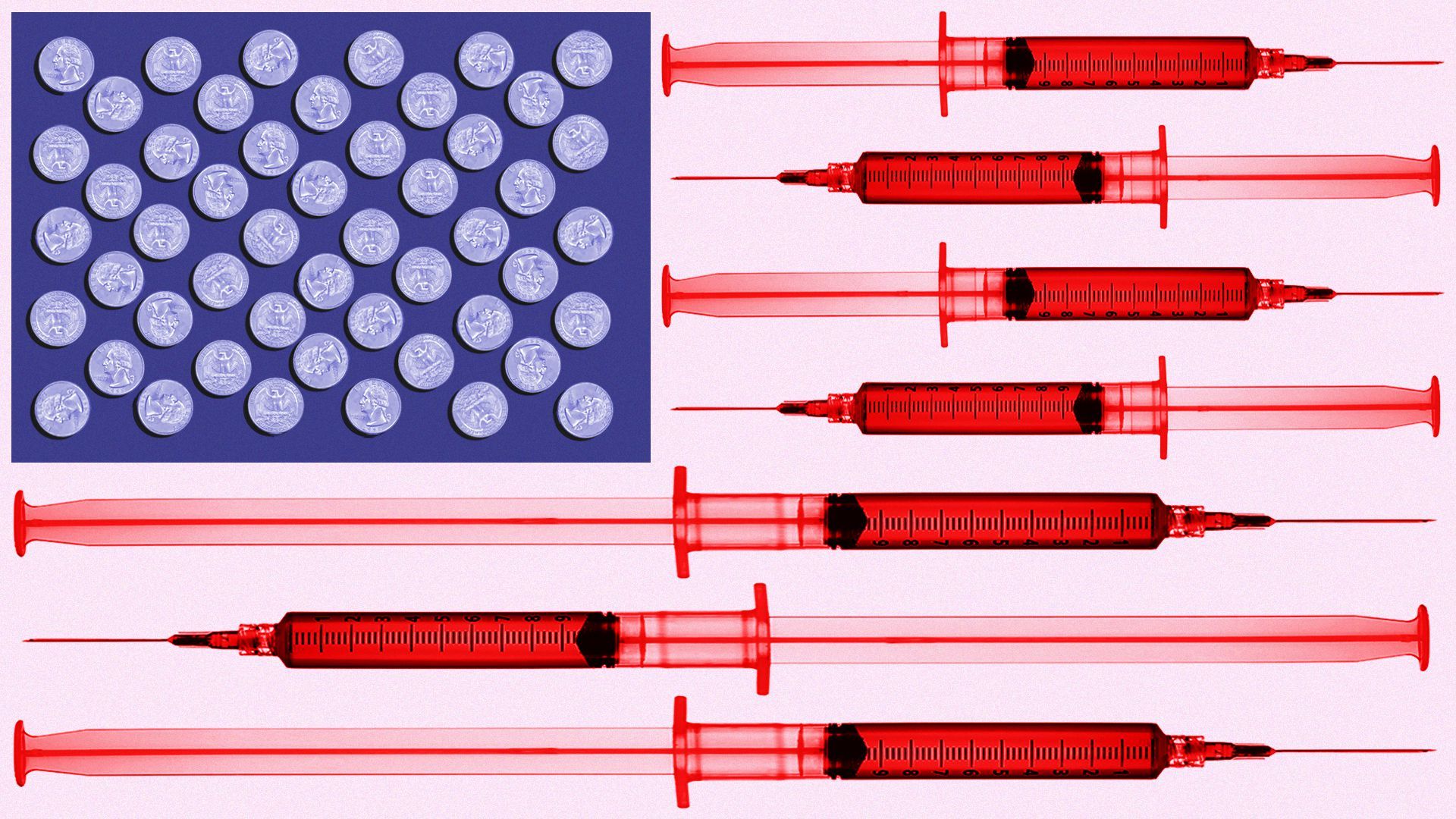| | | | | | | Presented By Raytheon Technologies | | | | Axios World | | By Dave Lawler ·Nov 16, 2020 | | Welcome back to Axios World. - Tonight we're getting vaccinated, swinging through a couple of conflict zones and cutting a big trade deal (1,627 words, 6 minutes).
New arrival? Sign up here. | | | | | | 1 big thing: Rich world takes the vaccine fast lane |  | | | Illustration: Sarah Grillo/Axios | | | | The vaccine breakthroughs from Pfizer and Moderna are incredible news, for a small sliver of the world. The big picture: Wealthy countries like the U.S. have secured their access to those vaccines and others and are increasingly confident they'll begin mass vaccination this spring. But according to research from Duke University's Global Health Institute, there likely won't be enough doses to cover the entire global population until 2024. Driving the news: Pfizer has agreed to sell at least 1.1 billion doses combined to the U.S., EU, Canada, Japan and U.K. That's nearly all of the 1.3 billion it aims to produce by the end of 2021. - Its vaccine also has to be stored at -80C, a requirement that few facilities in the developing world are equipped to handle.
Moderna's announcement today that its vaccine appears to be 95% effective should be better news for countries outside of the U.S. and Europe. - The storage requirements aren't as onerous and it's part of the COVAX portfolio of vaccines the World Health Organization and other groups plan to distribute to lower-income countries.
- Tal Zaks, Moderna's chief medical officer, told the Axios Pro Rata podcast today that the 20 million doses it will produce this year will all go to the U.S., which helped fund the vaccine's development and has purchased at least 100 million doses in total.
- Moderna also has deals with the EU and Japan. After today's news prompted questions over why it hadn't invested in the Moderna vaccine, the U.K. government announced it was in "advanced talks" to ensure its access.
- The flipside: "There is a dialogue ongoing with COVAX. I don't think we have quite aligned with them on how many doses and when those doses would be available for the COVAX collaboration," Zaks said.
What to watch: The best hope for a vaccine that will be quickly produced at scale for developing countries may lie with Oxford and AstraZeneca, which expect to release efficacy data for their vaccine by year's end. - That vaccine is also part of the COVAX portfolio and has a deal with the world's highest-capacity vaccine manufacturer, the Serum Institute of India.
- The Serum Institute is slated to produce two-thirds of the doses promised to low- and middle-income countries by AstraZeneca, Johnson & Johnson, Novavax and Sanofi, per WaPo.
State of play: Canada has purchased enough doses to vaccinate its population five times over, according to the Duke study. It's one of several countries hedging their bets to ensure access even if some vaccines aren't approved. - Several middle-income countries have cut smaller-scale deals with pharmaceutical companies or vaccine-producing countries like China or Russia.
- Brazil, Egypt and India are among those that expect to receive access because they have significant vaccine production capacity or are hosting clinical trials.
The bottom line: Much of the rest of the world is relying on COVAX. - Wealthier countries will effectively subsidize access for poorer ones, with an initial wave of distribution intended to reach 3% of each country's population and a second wave bringing that to 20%, potentially by the end of 2021.
|     | | | | | | 2. America's vaccine diplomacy |  | | | Illustration: Annelise Capossela/Axios | | | | With its bulk orders for six vaccines, the U.S. could find itself in control of around one-quarter of the world's near-term supply, according to the Duke analysis. Along with Russia, it's also one of the very few non-participants in COVAX. Why it matters: "I think we're going to see the tension between vaccine nationalism and vaccine diplomacy, where deploying some of our surplus vaccine doses in a strategic way becomes part of the U.S. foreign policy," says Dr. Krishna Udayakumar, director of Duke's Global Health Innovation Center. Joe Biden plans to re-engage with the WHO, though his team has not said whether he would participate in COVAX. - China is already promising access to its vaccines to friendly or neighboring countries.
- Russia, meanwhile, has cut deals with several countries for access to its vaccine, which Vladimir Putin has used to emphasize Moscow's global clout.
- There are now conversations underway to determine whether and how wealthy countries that purchased more doses than they ultimately need will be able to steer the surplus into COVAX, Udayakumar says.
The big picture: Beyond the humanitarian and diplomatic considerations, it's also clear that the pandemic won't be over anywhere — as a public health crisis or as a drag on the global economy — until it's under control everywhere. |     | | | | | | 3. Interview: Ivory Coast's controversial election |  | | | Patrick Achi (L) with officials, including Alassane Ouattara (C). Photo: Sia Kambou/AFP via Getty Images | | | | "What is taking place in Côte d'Ivoire is really, really different than what is taking place in other countries," insists Patrick Achi, a top lieutenant to President Alassane Ouattara. The big picture: Ivory Coast has become a bullet point in the narrative of democratic backsliding in Africa. As in Tanzania, the incumbent was re-elected by an astronomical margin amid an outcry from the opposition. As in Guinea, the president claimed a constitutionally questionable third term. - The differences, Achi argued in an interview with Axios, are that Ouattara only won his 94% vote share due to an opposition boycott — and he never wanted a third term in the first place.
Flashback: Ouattara announced in March that he would be stepping aside after overseeing 10 years of strong economic growth and stability in the world's top cocoa-producing country. - Then, in July, his designated successor died of a heart attack. That threw the ruling party into turmoil with four weeks left to register its candidate.
"Building consensus around a new candidate in such a short period of time was just unrealistic," contends Achi, who managed Ouattara's campaign and serves as secretary general of the presidency. - Noting that he could have been among the contenders fighting it out, Achi said the party decided instead to turn back to Ouattara, who had always claimed that constitutional changes in 2016 made him eligible to run again.
- Achi argues that a loss for his party would have resulted in a breakdown of "national cohesion" and erased the "great gains" of the last decade.
- "We could not take the chance not to have Alessane Ouattara pursue the election and take another candidate who might fail," said Achi.
Predictably, the opposition cried foul. - Things turned violent after opposition leaders — some of whom had been ruled ineligible to run — called for civil disobedience and instructed their supporters to boycott the vote.
- At least 85 people have been killed in clashes that preceded the election and have continued after it.
Security forces blockaded the homes of opposition leaders last week after they proposed a transitional government to oust Ouattara. - "Within the same country, they are declaring a new state — they are appealing for the army to be loyal to them. In no country in the world, such infamy would be accepted," Achi says.
Where things stand: Ouattara met with a leading opposition figure, former President Henri Konan Bédié, last Wednesday in an effort to calm tensions. Achi said he wasn't sure what the outcome of those talks would be, but mentioned the possibility of a unity government. |     | | | | | | A message from Raytheon Technologies | | The future of aerospace and defense is here | | |  | | | | At Raytheon Technologies, nearly 200,000 engineers, scientists and researchers are pushing the limits of known science to explore deep space, advance aviation and build smarter defense systems that protect all of us here at home. That's the future of aerospace and defense. Learn more at RTX.com | | | | | | 4. Mapped: Countries congratulating Biden |  Data: Axios research; Map: Andrew Witherspoon/Axios With China belatedly congratulating Joe Biden and Kamala Harris on their election victory on Friday, the list of countries still declining to acknowledge Biden's victory is getting very short. - State of play: Brazil's Jair Bolsonaro, Mexico's Andrés Manuel López Obrador and Russia's Vladimir Putin are among the very few world leaders who say they're waiting for President Trump's legal challenges to play out.
- North Korea's Kim Jong-un is in a slightly larger group — those who've declined to comment on the results either way.
Go deeper. |     | | | | | | 5. One to watch: China's new world order |  Map: Danielle Alberti/Axios The largest free trade area in the world came into existence over the weekend — and the U.S. wasn't invited, Axios' Felix Salmon writes. Why it matters: For the first time in living memory, the hegemon at the center of a major global free trade agreement is not the U.S. - China has stepped into Uncle Sam's shoes and now anchors the Regional Comprehensive Economic Partnership, or RCEP, an area covering 2.2 billion people and 1/3 of all the economic activity on the planet.
- RCEP includes rich democracies such as South Korea, Japan and Australia. Their position in this major free trade area will make it that much harder for President-elect Biden to unite them against China.
Go deeper. |     | | | | | | 6. What I'm reading: Tales from two conflicts |  | | | Villagers outside of Nagorno-Karabakh set their homes on fire on Nov. 11 before fleeing to Armenia. Photo: Alexander Nemenov/AFP via Getty | | | | 1. A haunting dispatch from the NYT's Anton Troianovski and Carlotta Gall on the aftermath of a dramatic peace deal for Nagorno-Karabakh: - "The cars, trucks and vans jamming the mountain roads deep into the night on Saturday brimmed with all the possessions that the fleeing Armenians could rescue: upholstered furniture, livestock, glass doors."
- "As they left, many set their homes on fire, enveloping their exodus in acrid smoke and illuminating it in an orange glow. Near some of the burning houses stood older ruins: the remains of homes abandoned a quarter-century ago, when Azerbaijanis fled and Armenians moved into the region."
- Dive in.
2. Simon Allison writing in the Continent on the climate of fear as a potential civil war begins in Ethiopia: - "Overnight, the entire region went dark, and has remained so."
- "... they could not get any information out of Tigray due to a province-wide communications blackout imposed by the national government: no internet, no mobile phones, no landlines."
- "'This is a throwback to the dark days of Ethiopian journalism,' said [Samuel] Getachew. 'Abiy allowed us to report on whatever we wanted for the first two years. And now we are going back. We were allowed to criticise him, and say whatever we wanted, and all of a sudden our social media is being supervised, and there is fear that whatever we say will come to haunt us in the future.'"
|     | | | | | | 7. Stories we're watching |  | | | Celebrating Diwali in Narayanganj, Bangladesh. Photo: Ziaul Haque/NurPhoto via Getty | | | - Trump plans last-minute China crackdown
- Western Sahara separatists declare war on Morocco
- Dominic Cummings is out as Boris Johnson's top aide
- Mexico tops 1 million cases; Austria announces lockdown
- Trump skips Southeast Asia summit for third year in a row
- Egypt uncovers 100 ancient coffins
- In pictures: Diwali celebrated amid pandemic
Quoted: "There are bad intentions to try to divide the country, and we aren't going to allow it." — Manuel Merino upon taking office as Peru's president last Tuesday, following the controversial impeachment of his popular predecessor, Martín Vizcarra. "I want to let the whole country know that I'm resigning." — Merino five days later, stepping down after mass protests and leaving the country leaderless. |     | | | | | | A message from Raytheon Technologies | | The future of aerospace and defense is here | | |  | | | | At Raytheon Technologies, nearly 200,000 engineers, scientists and researchers are pushing the limits of known science to explore deep space, advance aviation and build smarter defense systems that protect all of us here at home. That's the future of aerospace and defense. Learn more at RTX.com | | | | | | Axios thanks our partners for supporting our newsletters.
Sponsorship has no influence on editorial content. Axios, 3100 Clarendon Blvd, Suite 1300, Arlington VA 22201 | | | You received this email because you signed up for newsletters from Axios.
Change your preferences or unsubscribe here. | | | Was this email forwarded to you?
Sign up now to get Axios in your inbox. | | | | Follow Axios on social media:    | | | | | |










No comments:
Post a Comment